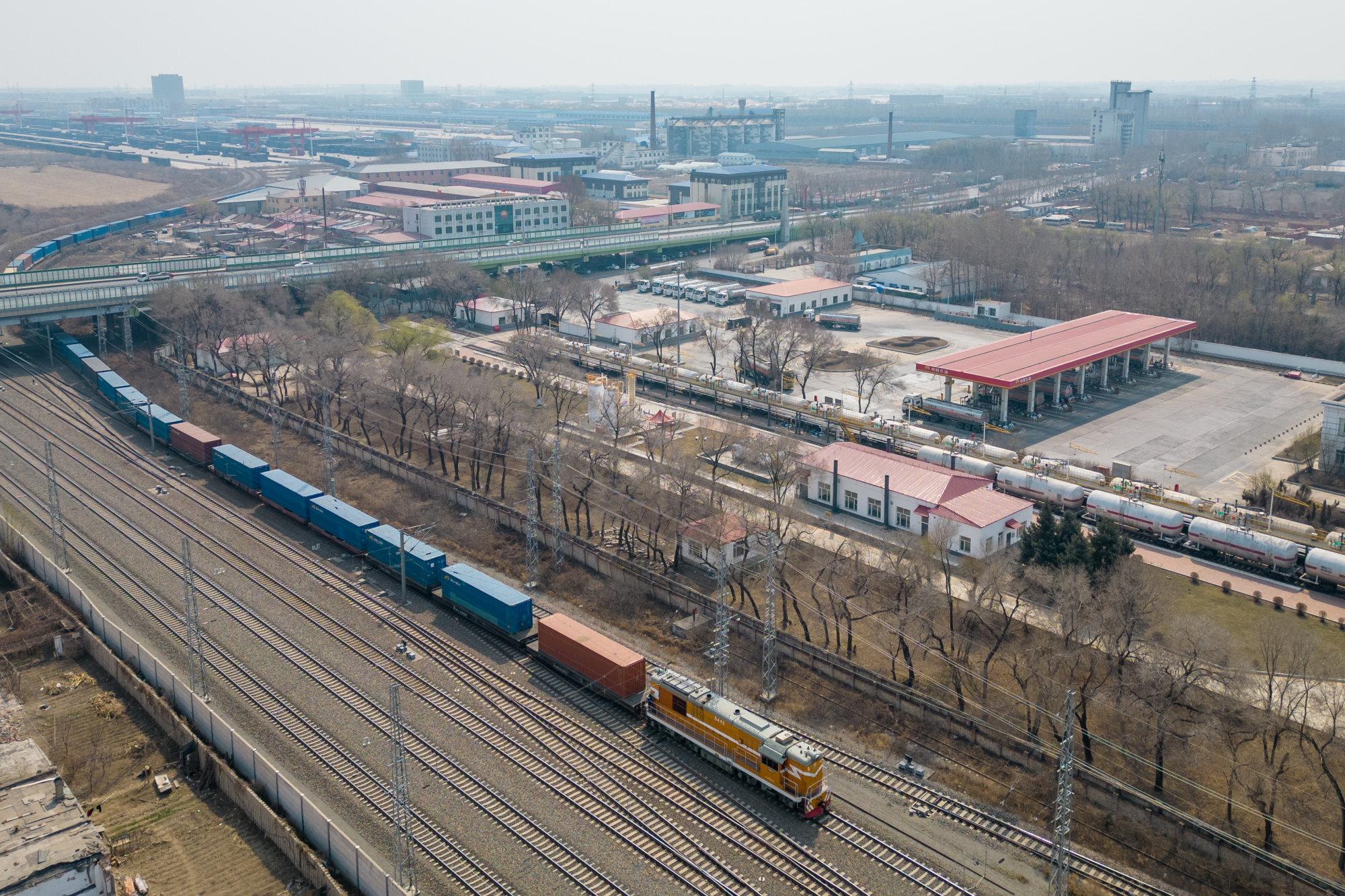- Many shipping companies have pulled their vessels from the Suez Canal route as Houthi rebels in Yemen continue to fire at cargo ships
- Some exporters are now using the overland rail route between China and Europe, with enquiries doubling since the Red Sea attacks began
With major disruptions already hitting global supply chains due to Houthi rebel attacks in the Red Sea, the situation is now set to worsen as shipping companies face the extra pressure of the coming Lunar New Year.
But one possible solution to the current shipping crisis may have been found as some exporters switch to the overland route provided by the China-Europe Railway Express.
Since November, Iranian-backed Houthi rebels, who control much of Yemen including most of the Red Sea coast, have been using exploding drones and missiles to attack commercial vessels using the vital trade route, as they protest Israel’s military operations in Gaza.
But now the headaches being experienced by shipping companies are set to get even worse as they deal with the extra pressure traditionally felt in the lead-up to Lunar New Year.
China, known as the factory of the world, produces a lot of goods for export before factories close for the annual holiday. But with ships being paused or diverted around the Cape of Good Hope, many are not expected to reach Chinese ports in time.
The Suez Canal provides the shortest shipping route between Europe and Asia. One of the world’s busiest waterways, it accounts for 12 per cent of global trade, including 30 per cent of all container movement, according to Egypt’s State Information Service.
Having to divert around the South African seaboard adds an extra 3,500 nautical miles to a ship’s voyage – up to two more weeks. This will delay the return of empty containers back to China, with a knock-on effect that will be felt around the world.
Analysts said there was no way the situation could ease before Lunar New Year, but noted that the China-Europe Railway could become an alternative for export companies.
Rico Luman, a senior economist with a focus on transport, logistics and the automotive industry for ING Research, said the current detours and longer trip durations will lead to further port issues in January and February, which in turn will affect supply chains.
“Things can only start to normalise – if a solution to the security threats is found – after Chinese New Year,” Luman said.
Delays caused by the shipping crisis will lead to major problems at ports, according to Marco Forgione, director general at the Institute of Export & International Trade, an association of exporters and importers.
“The ports will suffer from congestion … all that will cascade to create a multiplier effect from the impact of the disruption,” Forgione said.

With the shipping situation in disarray, some Chinese exporters have now turned to the China-Europe Railway Express, which connects China and Europe through an extensive network of rail services.
Forgione said there has been a significant increase in requests for information about the railway. It runs through more than 100 cities in 11 Asian countries and regions and reaches 217 cities across 25 European nations.
“The railway to Europe is a viable alternative and we are seeing increased demand for that route. The railway is more feasible for containerised traffic,” Forgione said.
“The expectation is that the use of rail could even double in the next few weeks as an alternative to sea freight.”
However, Luman did not agree that the Red Sea situation would have that big an impact on the rail connection.
“Shippers that are now threatened to run late for forthcoming important, higher valued deliveries will turn to air freight instead,” Luman said.

The Russian invasion of Ukraine and the subsequent sanctions imposed by many Western nations could also play a part in turning exporters away from the rail option, Luman said.
“It’s also still a problem for many Western shippers that trains usually run through Russia, so the most popular route now crosses the Caspian Sea and this takes longer than it used to,” he said.
Shanghai EPU Supply Chain Management Co president Tommy Tan told Chinese state-owned newspaper the Global Times: “The number of inquiries [about the China-Europe Railway Express] has doubled since these incidents began. We are actively preparing route configurations and increasing capacity for round-trip services to meet growing customer demand.”
Although sending freight by rail is more expensive than by sea, the trains from China to Europe would take about 12 days compared with the usual sea transit time of 35 to 45 days.
In the first 11 months of 2023, the China-Europe Railway Express operated a total of 16,145 trains, transporting the equivalent of nearly 1.75 million 20-foot containers, according to data from the China State Railway Group. The total volume of goods transported during this period exceeded the total volume recorded in the whole of 2022.

But as exporters look to alternative routes and modes of transport, the move will also see a shift in who wears the extra costs – and who loses revenue.
Lars Jensen, founder of Vespucci Maritime and former Maersk director, said the Red Sea attacks would lead to increases in freight rates, as well as causing a significant loss of revenue for Egypt due to the reduction in canal transits.
Jensen said, as a rough benchmark, avoiding the Red Sea would add around US$2 million to a ship’s journey in terms of fuel and other costs. This means for a full round-trip journey between Asia and Europe, each vessel could have an extra US$4 million in costs, he said.
Christian Roeloffs, co-founder and CEO of Container xChange, an online platform for container logistics, said freight rates through the Red Sea had already increased by 20 to 30 per cent. Similarly, average container prices have also risen, he said.
“In terms of average container prices, we notice a week on week increase across ports in Tianjin, Shenzhen, Shanghai, Ningbo and Huangpu,” Roeloffs said. “If we zoom in to individual locations in China, especially in Shanghai, Tianjin and Ningbo, then we notice that average prices of 40ft-high cube containers have been increasing steadily,” he said, adding this was largely attributable to the situation in the Red Sea.
By Jevans Nyabiage. 6 January 2024
Source: South China Morning Post. https://www.scmp.com/news/china/diplomacy/article/3247429/red-sea-attacks-see-exporters-turn-china-europe-railway-express-ahead-lunar-new-year. 8 January 2024.
You may also like
Container freight rates take a breather
Container freight rates take a breather. The spike in spot container freight rates has flattened off over the last week. The Drewry World Container Index (WCI,) which has been seeing double-digit percentage weekly increases recently, was up just 1% over the previous week on 11 July at $5,901 per feu. The Shanghai Containerized Freight Index (SCFI) slid 1% to 3674.86 [...]
Chinese oil demand likely to underpin tanker market in medium-term
Chinese oil demand likely to underpin tanker market in medium-term. Rising oil demand in China is likely to be a key factor in supporting the tanker market in the coming years, according to analysis from New York broker, Poten & Partners. Following a sharp downturn in tanker contracting that saw the orderbook plunge to new lows before tanker owners started [...]
Singapore port operator says vessel waiting time reduced to two days
Singapore port operator says vessel waiting time reduced to two days. PSA Singapore has been grappling congestion caused by the Red Sea crisis and has been reactivating berths that had been previously been closed down. A combination of longer rerouting of container ships via the Cape of Good Hope to avoid attacks by the Houthi in the Red Sea and [...]


